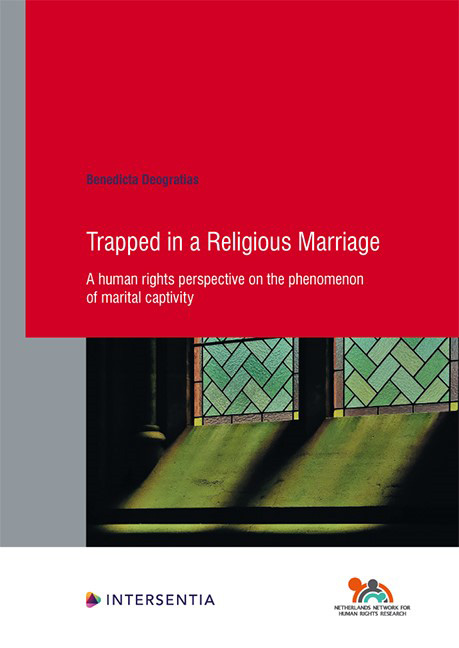Book contents
- Frontmatter
- Contents
- List of Frequently Used Abbreviations
- Chapter 1 Introduction to Marital Captivity
- Chapter 2 Religious Barriers to Divorce
- Chapter 3 Marital Captivity in the Netherlands
- Chapter 4 Marital Captivity and the Freedom of Religion
- Chapter 5 The Right to Divorce
- Chapter 6 The Trapped Spouse’s Rights
- Chapter 7 Violence Against Women
- Chapter 8 Conclusions
- Bibliography
- Curriculum Vitae
- Human Rights Research Series
Chapter 8 - Conclusions
Published online by Cambridge University Press: 22 December 2020
- Frontmatter
- Contents
- List of Frequently Used Abbreviations
- Chapter 1 Introduction to Marital Captivity
- Chapter 2 Religious Barriers to Divorce
- Chapter 3 Marital Captivity in the Netherlands
- Chapter 4 Marital Captivity and the Freedom of Religion
- Chapter 5 The Right to Divorce
- Chapter 6 The Trapped Spouse’s Rights
- Chapter 7 Violence Against Women
- Chapter 8 Conclusions
- Bibliography
- Curriculum Vitae
- Human Rights Research Series
Summary
The aim of this contribution has been to provide a human rights perspective on the phenomenon of marital captivity. The forms of marital captivity that have been addressed in this contribution concern situations in which religious doctrines or practices create impediments to the dissolution of a religious marriage. Consequently, one or both spouses may be forced to remain married against their will.
A situation of marital captivity may arise in those communities that either adhere to their own rites for divorce or explicitly adhere to the belief that divorce is non- existent. For example, Catholicism adheres to the doctrine that a marriage, in principle, is indissoluble. However, adherents may terminate a marriage by way of an annulment or divorce. The latter is permitted in limited circumstances (i.e. in the case of an unconsummated marriage or the Pauline privilege). In Protestantism, the civil dissolution of a marriage is mostly also accepted to include the dissolution of the religious marriage, although as has been observed in other religions, divorce should be sought after as a last resort. This perception may create pressure for spouses to maintain an otherwise unhealthy and at times even violent relationship. The existence of divorce in Hinduism remains a nebulous subject. While divorce is recognised in Judaism and Islam, women and men are awarded unequal rights to initiate a divorce. In Judaism, both the women and the men are required to cooperate to the divorce. The man must grant a writ of divorce and the woman must accept it in order for the divorce to be validly concluded. Non-cooperation by either of the spouses, in principle, will create a situation of marital captivity. In Islam, husbands can repudiate their wives. Wives, on the other hand, must secure the cooperation of their husbands for the divorce or demand the religious authorities to dissolve the marriage. Grounds for divorce by religious authorities, however, are very limited.
Notably, in both Judaism and Islam women and men experience situations of marital captivity in different ways. In limited circumstances, the trapped husband may be permitted to entertain a new relationship/marriage. This is a privilege that trapped women do not enjoy as they are only entitled to be married to one spouse at a time.
- Type
- Chapter
- Information
- Trapped in a Religious MarriageA Human Rights Perspective on the Phenomenon of Marital Captivity, pp. 325 - 352Publisher: IntersentiaPrint publication year: 2020



